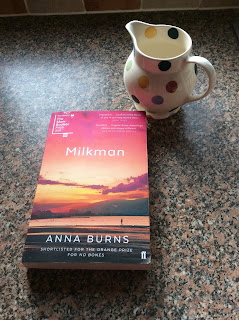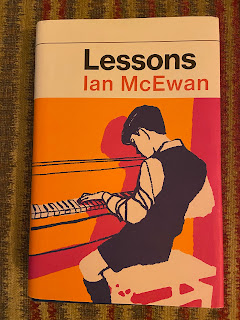'Milkman' by Anna Burns
This book did not come recommended. True it had won the Man Booker Prize, but even one of the judges had admitted it wasn't an easy read, which didn't seem promising. I heard of various people who had be unable to complete it, and one who had even ventured to purchase the audio version in the hope that this might be more accessible but who had again been defeated. To use the parlance of the book, my 'only daughter', who is a Literature graduate and whose informed opinions I respect, hadn't enjoyed it either, and I heard from others, variably, that the book had no punctuation, no paragraphs and no speech marks making it virtually incomprehensible. However, this was my book group nominated text, so I borrowed a copy off 'only daughter' and got reading.
To begin with, I was relieved to find it wasn't too bad; there is punctuation and paragraphing but in a stream of consciousness kind of way, and then, after a short time, I was surprised to realise I actually liked it. The narrative voice is unusual, but the substituting of labels for naming, once you've got used to it, highlights the relationships and connections in a way that a confusing plethora of names would not have achieved.
The characters are depicted in sufficient depth for you to care about their fates and the book gives life to the 'troubles' that were, fortunately for me, in the background of my own childhood in the 1970s, but for many in Northern Ireland, were an ever-present, claustrophobic reality of life. The book gives you a sense of the suspicion, fear, rumour and gossip, the smothering of happiness by expectation, and the horrifying extent of loss. It also juxtaposes love against marriage, and the mild eccentricity of escaping by 'reading when walking' against the total madness of a society at war with itself.
Whilst there are parts of the book that meander a little too much, such as the divergence around the cat's head in the ten-minute area, and the pace is slow, following the threads as they convolute and interweave rather than relentlessly pursuing a linear narrative, is actually quite refreshing.
And what I hadn't expected is the dark, wry humour that offers relief against the grim politicising. Wee sisters are a consistent source of amusement, and the latter part of the book, with Ma rediscovering love, has a slightly lighter, more optimistic feel.
So if you like your reading matter in a conventional style that doesn't require any adjustment, then this book is not for you. I suspect that this is rather a 'Marmite' work and that you are unlikely to be left feeling ambivalent. But , for me, this is a brave, individual and well-executed, book, which makes it a worthy Booker winner.
Verdict: Read
To begin with, I was relieved to find it wasn't too bad; there is punctuation and paragraphing but in a stream of consciousness kind of way, and then, after a short time, I was surprised to realise I actually liked it. The narrative voice is unusual, but the substituting of labels for naming, once you've got used to it, highlights the relationships and connections in a way that a confusing plethora of names would not have achieved.
The characters are depicted in sufficient depth for you to care about their fates and the book gives life to the 'troubles' that were, fortunately for me, in the background of my own childhood in the 1970s, but for many in Northern Ireland, were an ever-present, claustrophobic reality of life. The book gives you a sense of the suspicion, fear, rumour and gossip, the smothering of happiness by expectation, and the horrifying extent of loss. It also juxtaposes love against marriage, and the mild eccentricity of escaping by 'reading when walking' against the total madness of a society at war with itself.
Whilst there are parts of the book that meander a little too much, such as the divergence around the cat's head in the ten-minute area, and the pace is slow, following the threads as they convolute and interweave rather than relentlessly pursuing a linear narrative, is actually quite refreshing.
And what I hadn't expected is the dark, wry humour that offers relief against the grim politicising. Wee sisters are a consistent source of amusement, and the latter part of the book, with Ma rediscovering love, has a slightly lighter, more optimistic feel.
Verdict: Read



Comments
Post a Comment